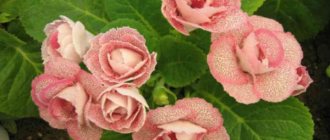Dahlias are flowers that are unpretentious in summer, but in late autumn they require increased attention from the gardener. A large amount of work is due to the fact that dahlia, being a heat-loving crop, cannot remain in the open ground in winter. On the eve of frost, the plant is dug up and stored until spring in the basement or apartment - whichever is more convenient. Proper care of dahlias in the fall and preparation for winter of one of the most beloved crops by flower growers is a guarantee that next year the plant will surprise with its rare decorativeness.
- 2 Cleaning the area
- 3 Preventative examination
- 4 Hilling and pruning
- 5 Watering and fertilizing
- 6 How to dig up dahlias
6.1 Video: preparing dahlias for winter
- 6.2 Video: how to preserve dahlias in winter
- 9.1 Reviews
What care does the plant need in the fall?
In the fall, efforts to care for dahlias are aimed at ensuring that the tubers successfully overwinter
In autumn, care is required for the soil on which dahlias grow (fallen leaves and debris must be removed - possible breeding grounds for infections), and the flower itself. It needs to be prepared for the coming cold weather - hill up, prune, change the order of watering and fertilizing, properly dig up the tubers.
Preparation for the winter period involves a number of activities, each of which requires some effort from the gardener, but allows you to save valuable planting material until spring.
Cleaning the area
Cleaning the soil will help eliminate the possibility of transferring various kinds of diseases to healthy plants.
Not everyone attaches great importance to this work, but in vain: the ground near the bushes must be thoroughly cleared of fallen leaves, petals, branches, and any other debris, since it is in them that various pests survive the longest, as well as pathogens of dangerous fungal infections that can destroy both planting material and plants planted in flower beds.
Cleaning is carried out 2 weeks before digging up dahlias, keeping in mind that when the air and soil temperatures drop, the tubers become especially susceptible to infections. Autumn rains mean that pests that have settled in plant debris can easily get deep into the soil.
Optimal storage conditions
In order for dahlias to overwinter well and not die during storage, certain conditions are needed. It is necessary to create a winter climate in the storage facility that meets the following indicators:
- temperature within +2-+4 degrees;
- required humidity 60-70%;
- good air circulation.
At this temperature and humidity, the roots will not dry out and rot will not appear. Gardeners usually store planting material of these flowers in the winter in a cellar or warm shed. Be sure to periodically check the rhizomes, remove rotten parts, make sure that the temperature does not drop and the material is well ventilated.
Advice! If you remove the rotten part of the tuber, you can treat the cut with ordinary brilliant green. This is the first disinfectant to protect against various infections.
During storage, dahlias can become infected with fungus. Most often it comes from the soil, so after digging the plant is washed with water and dried well.
It is important to decide whether it is possible not to dig up dahlias for the winter. This becomes clear if we remember where they came from. The plant is native to countries such as Guatemala, Peru, and Mexico. Their warm climate differs significantly from the harsh Eastern European climate; these heat-loving plants simply will not survive the winter in Russia.
Preventive examination
Sampling of affected plants should be carried out with special care.
All plants have to go through it. If a gardener finds dahlias affected by one disease or another, dried on the root, he will have to dig them up with a clod of earth and burn them in order to stop the spread of infection to neighboring crops. Characteristic signs of infection are a white coating caused by a fungus, brown spots, rot, as well as suspiciously rapid drying of the stem and leaves of the dahlia.
Non-viable plants that have never produced buds throughout the summer and whose stems are too long and fragile are also subject to culling. Unfortunately, we cannot expect that the result will be different next season.
Hilling and pruning
Some gardeners believe that if you cut all the stems with one cutting tool, you can spread viral infections to a significant part of the collection
Autumn hilling will protect the root system of the flower from possible night frosts. You can hill up the bush in the first week of September or at the end of August. The height of the mound at the base of the stem should be from 8 to 12 cm.
Trimming the stem at a height of about 15 cm from the ground is carried out after flowering has completed, and each “stump” must be equipped with a tag with the name of the dahlia variety.
Watering and fertilizing
After each watering or fertilizing, the soil under the dahlias must be loosened and weeds removed.
When it comes to watering, the gardener has to act against nature. The plant, preparing for winter, strives to stock up on moisture, accumulating it in the internodes located in close proximity to the roots. Thanks to this, the tubers will not dry out and active growth will be possible in the spring. However, if there is too much water, it will cause waterlogging of the root collar and rotting of the tubers. To prevent this from happening, watering is stopped two or at least one week before digging up the plants.
If it rains more often, the flowerbed with dahlias is covered with a moisture-proof film so that as little water as possible gets to both the plant itself and the soil.
As for fertilizing, restrictions are introduced here too. When preparing plants for dormancy, the last time fertilizers (potassium and phosphorus) are applied no later than August 20. Dilute 1 tsp into 10 liters of water. potassium sulfate and superphosphate and spend an average of 2–3 liters of solution on each bush.
Tuber division
The main goal of separation is to obtain root tubers of optimal size, when the number of growth points, and, accordingly, shoots on them, will allow for the most luxuriant flowering and proper development of plants
Experienced gardeners divide the tubers soon after digging - leaving this work until spring does not make sense, since the tubers will become coarse and the procedure will become more complicated. During the division process, the planting material is marked so that in the spring the most interesting flower arrangements can be created on the site.
Recent Entries
Lilac perennials that are beautiful, compact and do not crowd out other plants Why when buying seedlings you should not take the sellers’ word for it and how to determine the age of the plant using 3 signs Tomato seedlings have turned purple or whitish: why the color has changed and how to save the plants
If the tubers are small, it is not recommended to divide them into parts.
Where to store - expert advice
It is important to choose not only the right method for storing dahlias in winter, but also to choose a good place for this. There are several options for where you can place the roots for safekeeping. Which one to give preference must be determined based on your capabilities.
The correct choice of storage location for dahlias guarantees their integrity
In the basement
If you have a basement, then it is recommended to arrange shelving there to store dahlia planting material. Subsequently, boxes or boxes can be installed on them. It is important to know what level of humidity and temperature remain in the room throughout the season. These factors significantly affect the safety of planting material.
It is convenient to store dahlias on racks in the basement
Tubers can be stored by placing them on shelves. However, if the basement is dry, then you will need to regularly humidify the air using a spray bottle, which is extremely inconvenient. Several times during the entire storage period it is necessary to sort through the root tubers and remove any that are damaged or have signs of disease. If the damage is minor, then you can cut off the sore spot, and then treat it with brilliant green, a good fungicide, or a strong solution of manganese. If the nodules begin to fade, then try to slightly increase the humidity level in the room by spraying with a spray bottle.
In the cellar
Dahlias love constant temperatures and do not tolerate freezing. If you have a cellar, then you need to know to what minimum the temperature in it can drop in the coldest months. If freezing is possible, insulation methods should be considered in advance.
A good cellar will help preserve dahlia tubers
The ideal cellar for good preservation of dahlia planting material is considered to be a cool and humid room in which the air temperature ranges from +1°C to +7°C and the humidity is maintained at 80-100%. In such conditions, the roots will not dry out or sprout prematurely. Not ideal, but an acceptable option would be a cool but dry cellar. But it’s better to avoid a warm and humid room altogether.
In the apartment
How to preserve dahlias in an apartment until spring? It is very problematic to preserve dahlias until spring. But nothing is impossible, and in the absence of other options, you can achieve the desired result. The main problem is a significant excess of the temperature in the apartment above those recommended for good preservation of root tubers. If you have a small number of roots, they can easily be placed in the plus compartment of the refrigerator. The fact that there is a lot of planting material will cause more inconvenience.
Preserving dahlias in apartment conditions is problematic, but possible
To store dahlias in an apartment, you can use well-insulated boxes that are placed on a closed balcony or loggia. In the event of a threat of a strong drop in temperature, when the thermometer drops below zero, the boxes are brought directly into the apartment and installed in the coolest place. As a rule, it is located near the balcony door. As soon as the threat of freezing has passed, the containers are returned to the balcony.
Determine the name of a garden flower from a photo. In a special publication on our portal we will talk in detail about garden flowers. You will learn about the types of garden flowers, perennials that winter in open ground and look at the photo gallery.
Paraffin treatment
Immerse the tuber in melted paraffin for 1 second, remove it, wait a few seconds and lower it back into the resulting liquid.
This procedure well protects planting material from damage during winter. Dried tubers are dipped in molten paraffin. Then drying follows again for at least 2 days. In such a reliable shell, the rhizomes are placed in cardboard boxes. And they can even be stored in the room. When the sprouts begin to hatch in the spring, they will easily overcome the paraffin layer.
You can also use the chicken egg white treatment method. It is whipped, and then the rhizome is coated with it with a brush. To achieve a better result, the treatment is carried out 3-4 times, ensuring that each layer dries completely.
How to store dahlias in an apartment in winter? Wrap it in film!
If you choose to treat dahlias before storing them for the winter, then cling film from the store will be suitable for home use. Can't be? Maybe!
That's exactly what it is. Incredible - it allows the corms to breathe. They do not rot, do not rot, and do not dry out. First we process it, separate it by type → wrap it → sign it with a marker (very convenient) → put it in a box and look for a cool place in the apartment.
Video: When to dig up dahlias and how to preserve them without a cellar
So, to decide how to store dahlias in winter,
All you have to do is choose the appropriate method for yourself. And then, the needle-shaped beauty will settle in the garden forever. It will become a true decoration of the hacienda. On a warm summer evening, drinking tea on the veranda, you will inhale its subtle aroma and admire the dazzling Mexican. Can we call him that? Yes. He comes from those places.
More than 500 more articles on the channel of the same name in Yandex Zen . It is with great pleasure that we invite you to visit our VKontakte group. By joining it, you will always be aware of the release of new publications on the “4 Seasons of the Gardener” !
A small request. If it’s not a burden for you, please share this note with your friends on social networks. Perhaps they also want to know how to store dahlias in winter at home... ✍
Autumn care for dahlias, taking into account regional characteristics
In an apartment, planting material should be stored in the coldest place; as a rule, they are placed in a box and placed next to the balcony
In the southern regions of Russia, there is a practice of leaving dahlias to overwinter in the ground. Acceptable low temperatures range from -5 to -7°C. Plantings are prepared for wintering as follows: the stems and leaves of dahlias are cut and removed from the flower garden, and the soil is covered with mulch from the bark or branches of coniferous trees. The protective layer should be 5–10 cm. Neither peat nor compost can be used as mulch: if air temperatures are positive, rotting of the cervical part of the roots may begin under a layer of these materials.
However, no matter how carefully the pre-winter preparation of plantings is carried out, there is still a risk of losing flowers. Therefore, many gardeners, even in the south of the country, fearing unpleasant weather surprises, dig up dahlia tubers. This happens at the end of October - beginning of November.
In the Urals, this work usually occurs at the end of September - the first days of October, in Siberia - it is limited to September. In the middle zone (including the Moscow region), dahlia tubers are usually dug up in early October.
Preparing dahlias for storage
To the question of whether it is necessary to dig up dahlias, the answer is definitely yes. Then you need to carefully prepare them for wintering. The bush removed from the ground is washed well in water, removing the soil remaining on the roots. Next it should be divided.
The growing point of the plant has several buds. Each division should be left with 2-3 such buds. The main shoot can be easily cut into pieces before it becomes coarse, so division should be done immediately after you have finished digging up the bush.
Damaged, rotten and old parts of the plant are cut off, leaving a healthy young seedling. It is placed in a disinfectant solution. Fitosporin gives a good effect. This biological agent is not poisonous.











